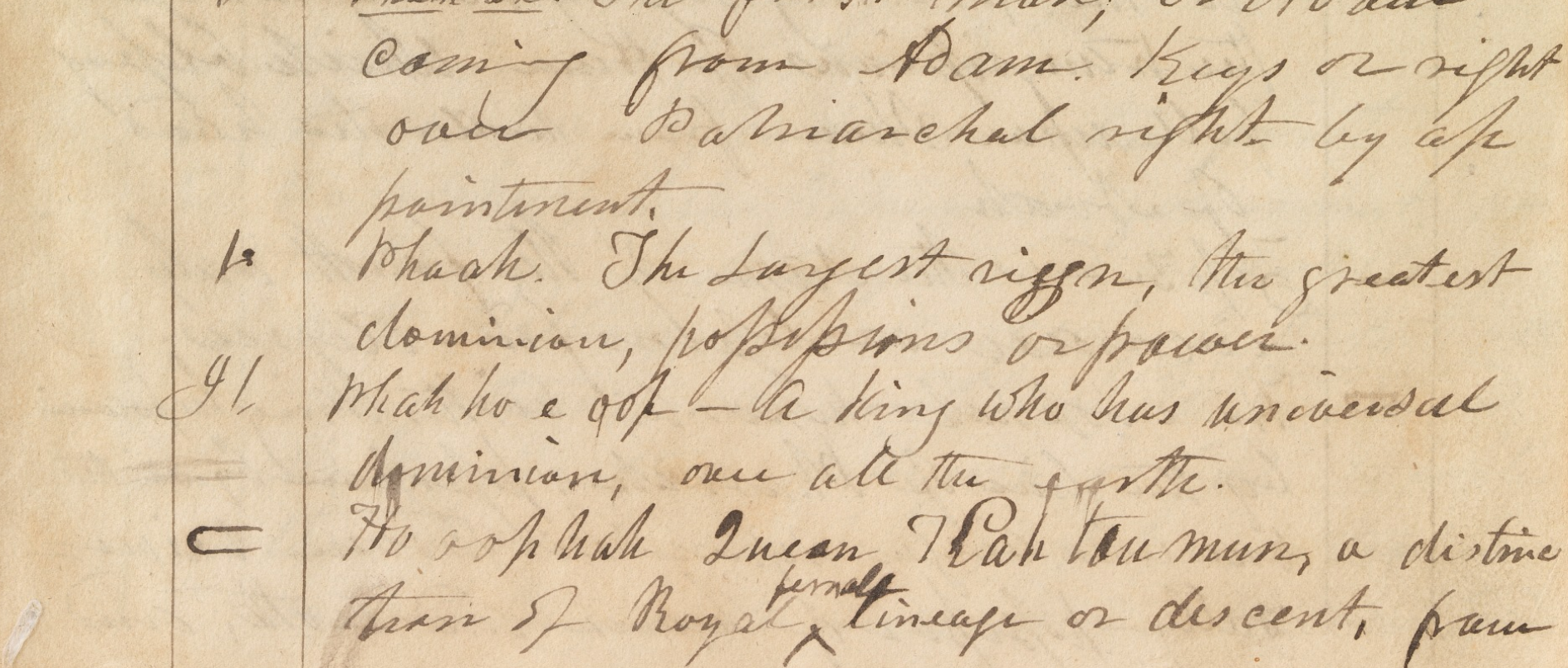
GAEL: Part 1, The Second Degree
No. 1 [Canceled Character]
This character on the second degree has an arbitrary sound= All <Beth> This character, that is the character of the second degree, is designated from characters of the first degree by the manner of its being inserted in the compound: as follows: when it is connected it has the signification of the second degree; and when disconnected from the names of other places, it stands for the original sound of Kal=si doanhiash Kah=oan98 <for Chaldee> And it should be known, as being in the second degree, in order to vary the verbs, prepositioins participles conjunctions, and adverbs: All names of rivers, seas, of lands of hills, and of mountains should be preserved in their order according to their degrees, from the first For instance, the first connection should be called Jugos, which signifies verb or action: and the second connection should be called Ka=Jugos, which is a variation, according to the signification of the second degree: Kah Jugos should <be> preserved in the second degree. It signifies an action passed: The third connection is called Kah Ju=ga=os, which signifies an action to be receved or <to> come to pass. The fourth connection is called Ka=os-Ju which signifies connection and the fifth is called Ka-os=Juga=os and is used to qualify according to the signification of the fifth degree. whether for prepositions, verbs, adve[r]bs &c. This order should be preserved according to the signification of the degrees
No. 1 [2.15]
Beth— a fruitful garden, or a great valley or plain filleed with fruit trees and flowrs
No. 2 [1.14]
Iota. To see:
No. 3 [1.18]
Zub100 Zool=oan— The first of anything
Ki To see
oan= The first of any thing
No. 4 [5.28]
Ah=brah=oam <Ah=broam>—103 Ah broam— a follower of righteousness
No. 5
Kiahbroam,= Coming down from the begining. To some place or fixed period The first in lineage, or right in lineage
No. 6 [2.16]
Bethka— a larger garden— more spacious plain This should have been inserted between Iota an[d] Zub Zool oan—
No. 7 [3.15]
Iota nitahveh ah-que= its signification is increased from the first degree five times: for instance I saw one hun five times twentyfive persons, or one hundred and twenty persons: It signification may be lessened one half by the
No. 8
mark as in the margin— and again lessened
No. 9
one half of the latter half the mark as in the margin It signification is increase tenfold by the mark
No. 10
as in the margin: Its signification is again increased one hundred fold by the the additional
mark in the margin: Its sound is Ah=que kah Ju:106 and its signification is a multiplying adjective.
[1.1]
Ahlish. The name of the first Being: supreme intelligence—
[1.2]
Phah=eh Kingly power= or king
[1.3]
Pha=ah— Having greater dominion, or possession or power.
[1.4a, b]
Phah ho e oop. Royal blood or pharoah
[1.5]
Ho oop hah— Corwn [crown] of a married queen
[1.6]
Zi The principle of virtue— a young female adorned with the modesty of virtue and comeliness
[1.7]
Kah tou mun, a distinction of royal female lineage
[1.8]
Zi oop hah a distinction by right of heirship by Pharaoh
[1.9]
Ho e oop A virtuous prince
[1.10]
Zipzi— a woman married or unmarried or a daughter, or mother, or mothers, and sometimes the first woman, who was Eve
[1.11]
Ho=e-oop=hah: a king:
[1.12]
Ahe.108 inh[ab]itable part of the earth
[1.13]
Toan. tou ee tah-ee tou tah eh toues: under water water, under the earth.
[1.14]
Iata109 Having Seen or sight
[1.15]
Iota tou-es Zip zi The land which was discovered under water by a woman
[1.16]
Su e-eh-ni. The same as in the first degree
[1.17]
Ho e oop hah phah eh. The principle of rule or ruling or reigning upon the principles of Justice equity and righteousnes
[1.19]
Zubzooleh: The earth as it was in the beginning: or at its creation; creation110 or beginning
[1.20]
Zub-eh To be with as, as light is in the earth
[1.21]
Zub. pointing to that which has been created To the first institution or first principle:
[1.22]
Zub Zool from the present time unto some stated period after.
[1.23]
Zool: From Abraham back to his father and from Abraham’s111 father back to his father and so on back through the line of <his> progenitors
[2.16]
Beth ka— A large garden, a large valey or a large plain, This aught <to> have been inserted between Iota and Zub Zool aon on the opposite page.